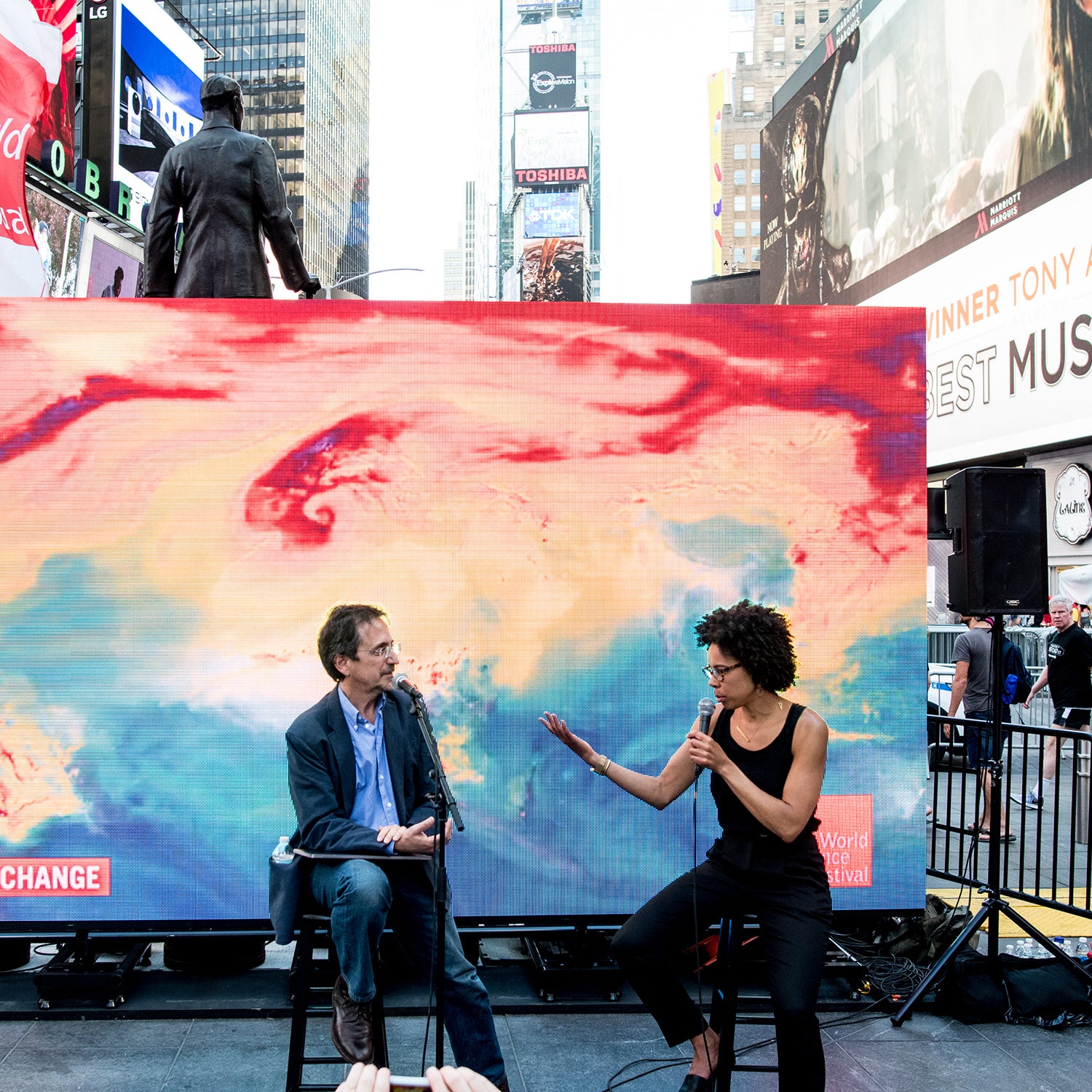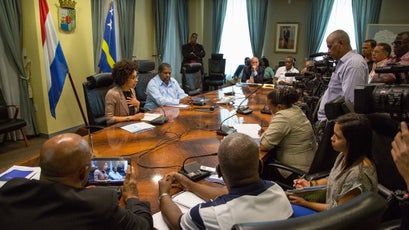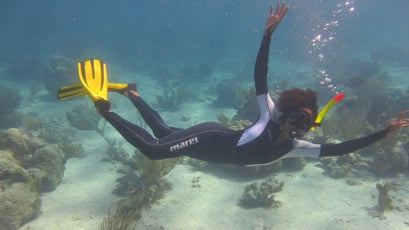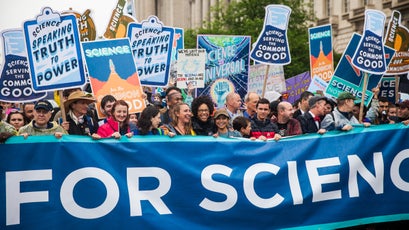Marine biologist Ayana Elizabeth Johnson fell in love with the ocean when she was five years old, during a family trip to Key West. She has spent her career figuring out creative ways to ensure its livelihood, and she’s become a jack-of-all-trades in the process. Earlier this year, Johnson co-directed the , the largest coalition of scientists in history, with more than 300 organizations participating. During her time as executive director of the Waitt Institute, a marine conservation nonprofit, she helped launch the , working on sustainable policies with governments in places like the Caribbean.
Now Johnson is an independent consultant on ocean conservation, so she hasn’t been doing as much diving or specimen research as she used to. One day she may be drafting and editing policy or traveling to coastal destinations to meet clients; the next day, Johnson will be hosting seminars at New York University, conducting research, surveying a site, or writing articles to inspire the masses. “Sometimes I wonder if I’m really a marine biologist,” she says.
Science is still at the root of the job, but Johnson knows that people play a key role in protecting the environment. “For conservation to be sustainable, it can’t be just about doing the actual conservation work, but doing it in way that works for people and communities.” In September, Johnson will debut , an assembly of marine superstars, including surf champ Easky Britton, oceanographer Katy Croff Bell, and filmmaker Martha Jeffries, who will offer their expertise to institutions and brands. That could mean anything from writing a business proposal for a new nonprofit to producing a killer video on coral reef conservation. Think of it as a superhero league for the ocean.
Age: 37
Job: Marine biologist and independent consultant
Education: PhD in marine biology at the University of California at San Diego; bachelor of arts in environmental science and public policy at Harvard University
Home Base: Brooklyn, New York
Daily Ritual: “I wake up without an alarm around 7 or 8 a.m. and skim through email to see what I have to think about. Sleep is the most important thing—I’m not very good at it yet, but I’m working on it.”
Favorite Animal: “Octopuses—they have three hearts and are extremely intelligent.”
Favorite Dive Site: “The north shore of Curaçao has some of the healthiest coral reefs in the Caribbean, and they are in need of protection.”
How She Broke In: “The most consistent piece of advice I give anybody wanting to get into marine conservation is to develop a broad set of skills. Yes, you need science, but also socioeconomics, law, behavioral science, writing. Any conservation challenge is interdisciplinary by nature. If you don’t have every skill in one person, then everything needs to be about building the team. The Ocean Collectiv is the next iteration of that. The idea is to pull different members from the team to tackle projects based on the expertise needed for the challenge.”
Biggest Challenge: “In a lot of ways, I think the ocean has a bad PR problem. There is the ‘out of sight, out of mind’ challenge. The challenge of people thinking, ‘It’s so big, we can’t possibly have overfished the entire thing.’ It’s hard for some to understand how important the ocean is and how at risk it is. We are competing with all the near-term challenges people face in their daily lives. With conservation work, you don’t see the benefits right away, so that trade-off of near-end pain and long-term benefits is a tough balance.”
Driving Philosophy: “Ocean conservation is not about fish; it’s about people. Fish are just swimming around trying to find food, eat, have babies. People are the ones that alter nature, so a lot of the work is about changing human behavior and building political will. There is an interesting tension for coastal communities, in which the ocean is a source for food, jobs, and recreation, but it’s also storms, drowning, sharks, and things that are scary. To do work that resonates in each place, we should keep in mind that different cultures and communities have different relationships with the sea. If a family can’t have a fish fry, if people can’t go fishing, diving, or swimming in the ocean, then we lose a lot of valuable interactions and culture.”
Career Highlight: “The day Barbuda signed its fisheries regulation into law after all the work we did through the Blue Halo Initiative is my proudest moment to date. It was the first zoning project of its kind in the Caribbean, and it ended up protecting one-third of the island’s coastal waters. We worked nonstop for two years. I developed and managed all aspects of the science, community engagement, policy, capacity building, press, and social media. I interviewed fishermen and other stakeholders, drafted policy proposals, facilitated community meetings…It was a huge undertaking, but it was also incredibly rewarding. Although the project was based on science, it involved the community. We respected the coastal communities that would be affected and came out with a sustainable solution that had a real impact.”
Work-Life Balance: “It’s a blessing and a curse to have the two so closely intertwined, because jobs and careers change, and you don’t want to lose yourself when it does. But due to the interdisciplinary nature of what I do, everything in my life ends up being relevant to the work. When I listen to music, I think about how art can help us make a message more effective, or if I’m reading an article, I’m thinking about what makes it compelling.”
How She Minimizes Desk Work: “As an independent consultant, it’s easier to choose when, how, and where you work, and I feel lucky for that. One of my tricks is to work from our family farm in upstate New York. I spend a lot of time at the end of a dirt road on top of a hill surrounded by nature. It’s not the ocean, but there is something so important about spending time outside in any kind of outdoors.”
How She Recharges: “I buy into the philosophy of biophilia, which says that we inherently love nature and evolved along with it. So for me it’s about being outside—watching my chickens, going to the ocean, the mountains. There is the health benefit, but it also helps me intellectually. When my mind is relaxed, it works in more interesting ways.”
Taking a Break from What You Love: “For a while, I didn’t really enjoy going to beach, because it felt like work. I felt like I should be doing something—counting fish, surveying reefs. For two years, I was working so hard getting Blue Halo off the ground that at the end of that I had to distance myself a bit. Now I am able to enjoy being on the coast again. For me, the ocean has a magnetism. You will always be drawn back to it. But taking time away from the thing you love is sometimes the best medicine.”
The Benefits of City Life: “I moved back to New York City a year ago, and oddly it’s turned out to be ideal place to do ocean conservation. For one, there is more creative thinking about what that means here, because it’s not entrenched in policy or NGO framework as it is in D.C., for example. And New York City is a coastal city. We are coming up on the five-year anniversary of Hurricane Sandy, and what can remind a city that we are right on the ocean more than that? There’s a vibrant surf culture evolving in the Rockaways, and it’s great to see oyster restoration happening in the harbor. Whales are coming back. There are sea horses living under piers in the Hudson. The rivers are cleaner than they have been in 100 years, which means the Clean Water Act and all the efforts to improve water quality around New York have actually been working. Plus, for me it’s exciting to bring back what I have learned to my hometown and figure out how I can be helpful here.”
Protecting Urban Centers: “When we think about marine biology, we think about reefs and remote islands. And while those places are important and should be protected, there is a whole other world in need of attention. Urban ocean conservation is an area that is not getting a lot of attention, and it should be, because we need to figure out how to coexist with the ocean when millions of people are living on the coast. Urban areas developed around regions with rich marine environments for a reason. We have to think about what led cities to be built around the water in the first place and work to restore that balance.”
The Importance of Working with Women: “To be really effective, we have to think long-term, and sociology tells us that women inherently tend to think longer-term because they consider the future for the next generation and providing for their children’s well-being. When we don’t incorporate women in the planning stages, we’re ignoring one of the biggest assets in conservation—the half of the world that inherently thinks more long-term.”
The Next Generation: “Young people have an understanding of science, economics, and culture and how all those things play together. For me, it’s important to keep young people in the field, so I try to say yes to most of the mentorship requests that come my way.”





